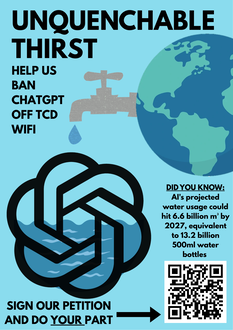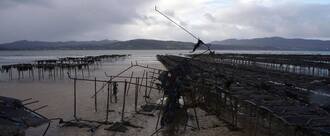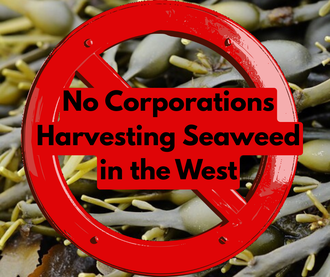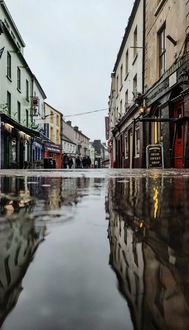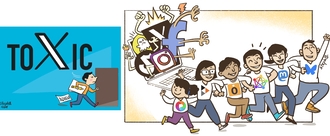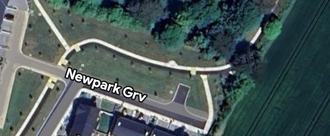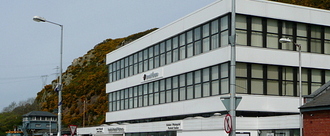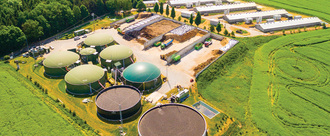- Featured
- Animal Rights
- Anti-racism
- Arts & Culture
- Children
- Climate
- Corporate accountability
- Crime
- Disability rights
- Economic
- Education
- Environment
- Food and Sustainable Production
- Gender Equality
- Governance and Transparency
- Health
- Housing
- LGBT Rights
- Mental health
- Northern Ireland
- Planning
- Privacy and Data Protection
- Rural Inequality
- Social Justice
- Trade
- Transport and Infrastructure
- Workers' Rights
- More
-
Unquenchable Thirst: OpenAI's Drinking Water Usage and How Trinity Can HelpThe environmental impact of using generative AI is incomprehensible to the general public. In 2025 alone, the data centers used to run OpenAI tools were responsible for 32.6 - 79.7 million tonnes of CO2 emissions. According to OpenAI engineers, clean drinking water must be used to cool the data servers in order to prevent "mineral build-up" in the cooling systems. Data centers are literally using one of humanity's most precious and scarce resources to cool their servers, and it is dwindling by the day. OpenAI's projected water usage could hit 6.6 billion m³ by 2027, which is equivalent to 13.2 billion 500ml water bottles. Although this issue seems out of our hands, students can do their part by helping ban ChatGPT from the Trinity College Dublin Wi-Fi. ChatGPT is the most widely-used generative AI model, thus, blocking access would drastically reduce students' contribution to this ever growing problem. You can help do your part by signing our petition!84 of 100 SignaturesCreated by Ella Flynn
-
Refuse Aquaculture and Foreshore Licence Application T12-462A in Lough SwillyLough Swilly is not just a stretch of coastline — it is a shared natural resource that belongs to the whole community. It supports protected bird species, fragile sand dune habitats, daily recreational use, and a tourism economy that many local families and businesses depend on. Once large-scale development is approved in protected coastal areas, it is extremely difficult to reverse. Decisions made now will shape the future of the lough for decades. If the wrong balance is struck, we risk long-term ecological damage, further spread of invasive Pacific oysters, loss of amenity, increased marine debris, and harm to the natural landscape that defines this part of Donegal. It is also important because the first application was not widely known within the community, and many local residents did not have an opportunity to make their views heard until after it had already been accepted. Public participation is a fundamental part of environmental decision-making. Communities should be properly informed and given a fair chance to engage before decisions are made — not after. This is about ensuring transparency, fairness and proper protection of a designated and valued coastal environment.1,564 of 2,000 SignaturesCreated by Save Linsfort Beach
-
Stop large corporations harvesting huge forests of seaweed from the west coastThere should be a public consultation on this plan opening soon but lets gather signatures to demonstrate the fact that up and down the west coast, thousands of people don't want our seaweed rights given away to corporations.19,489 of 20,000 Signatures
-
Let’s chill the worldTo address climate change and its devastating effects. Climate change causes widespread, rapid, and intensifying impacts, including extreme weather (heatwaves, droughts, floods), rising sea levels, ocean acidification, and severe biodiversity loss. These changes disrupt ecosystems, threaten human health, destroy infrastructure, and endanger food supplies, with significant risks to coastal communities and vulnerable populations.16 of 100 SignaturesCreated by Rachel Farrell
-
Take X icons off websites and emails ! And replace with Mastodon icons !Why leave and de-platform toxic and lock-in social media (such as X, Instagram, Snapchat, Tiktok) ? Black Box Algorithms: Lock-in platforms aim to show you more content that their owners like Elon Musk, Mark Zuckerberg and their paymasters want you to see, and less content that you want to see…. https://xodus.online/why#algorithms Rise of the far-right: Toxic platforms promote hate, the far-right, and interfere in elections…. https://xodus.online/why#democracy Disinformation: Toxic platforms do not support adequate fact-checking or moderation…. https://xodus.online/why#disinformation Over-consumption: Advertising-profit-platforms promote consumption patterns which are unhealthy for people and planet…. https://xodus.online/why#consumerism131 of 200 SignaturesCreated by Elaine Baker
-
Newpark estate - No to developers taking our green spaceJoin our campaign to ensure FCC decline planning permission on the following basis : 1. Resident safety – o increased car traffic and reduced greenspace: ▪ With nearly 90 residential units , the majority who are families with young children in the estate, the existing recreational greenspace of Newpark estate will be heavily and negatively impacted by the proposed development . Our existing greenspace is a very busy and much needed space. The proposed development would reduce greenspace and would affect the safety of the existing cycle way that leads directly from the Newpark estate playground area– see maps below . The proposed new road access to Newpark Grove would effectively cut across our walk/cycleway and therefore remove the existing safety of this route from the playground and is very close to a corner therefore creating a serious safety risk from children cycling or scooting on their return from Newpark playground and green space . There is already direct access from the Manor house site onto Newpark drive , the council should not approve the taking of much needed greenspace and cycleways from residents to create new roads when they are not necessary. o Impacts proposed cycleways. ▪ As part of the Kinsealy area development plan, and following the conclusion of a successful public consultation – link the preferred walk/cycleway to Portmarnock train station will commence adjacent to where the planning permission is proposing to create access into Newpark Grove i.e. this planning permission request proposes a new road that goes across a cycleway that serves as a vital continuous connection into a very strategic proposed longer cycleway that will run to Portmarnock train station. This preferred route through Newpark to Portmarnock will be a strategic development in the coming years for the entire Kinsealy area and it is expected high volume cycling and pedestrian traffic will use this route to access the dart station, therefore it makes no sense to now put a new road directly across this route just to satisfy the financial gain of a developer to the detriment of residents and Kinsealy area safety. ▪ Kinsealy residents have been campaigning for many years now and have been in regular contact with Fingal County council to INCREASE our walk/cycleways, this proposed development TAKES AWAY from the very limited ones we already have. 2. Harm to character of the greenspace: o The Kinsealy manor house is an important and historical feature in the area, and this was one of the reasons previous planning permissions were refused. Accordingly, now building 3 modern MEWS houses directly on the site of this impressive building will impact the character of the protected structure. 3. Overdevelopment of already high-density estate: o Newpark estate is already high density at nearly 90 residential units, adding three more Mews type units is over development and unnecessary. 3 Mews type units does not align to housing shortage argumentation for this area or more generally, it is purely to satisfy the financial gain of the developers and not in the interest of residents. o Chapel road is now at bursting point in terms of houses vs public infrastructure ratio. There are no buses running down chapel road, no safe access to Dart station, no other way to get to Supermarkets than drive. Chapel road needs capital infrastructure investment by Fingal County Council NOT more residential units that eat our greenspace and create more safety risk for our children. o The proposed development proposes 1 parking space per unit. Kinsealy area is an area lacking significant structural development with no bus routes, no current access to Dart station, no pathway or cycleway to supermarkets. 1 parking space is not sufficient for each house as so it is likely these units would have parking shortages and be forced to park on Newpark estate roads thus causing blockages for emergency vehicles, impacting ability of children to see cars coming, frustrating existing residents with additional cars parked up on roads that are now free of such parking because houses in Newpark were planned properly with 2 spaces . 4. Environmental impact – loss of existing trees, further additional development in this area of the estate is not recommended given the high level of development in the past few years. This part of the estate should be preserved for nature and existing protected structures both to the benefit of the environment and resident wellbeing. 5. Overlooking residential playground resulting in privacy and wellbeing concerns for residents – overbearing development of MEWs housing proposed to be almost directly on top of children playground and recreational space.82 of 100 SignaturesCreated by Sharon Finn
-
Early train from Dublin to Carlow , Kilkenny and WaterfordReduce traffic congestion and encourage use of public transport351 of 400 SignaturesCreated by James doherty
-
Take Action for Farmed AnimalsCalves are separated and transported too young and without proper feeding systems. Pregnant sows are confined to extreme metal-barred crates. Broiler chickens being grown at rates where they can't support their own weight, packed into overcrowded sheds.15 of 100 SignaturesCreated by Benjamin Anderson
-
Solution not Pollution - Real Time Sewage Discharge MonitoringIreland Needs Real-Time Reporting of Sewer Discharges - Just Like the UK Across Ireland, rivers, lakes, estuaries, bathing and coastal waters are being polluted by regular storm overflows and sewer discharges, yet the public has no way to see when or where these events occur. Unlike the UK, Ireland has no national, real-time monitoring system to tell communities when their local waters are contaminated. Under the Urban Waste Water Treatment Regulations and Directives, Uisce Éireann and sanitary authorities are already legally required to monitor wastewater discharges and assess their impacts on receiving waters. But many overflows have no monitors or are not up to code. Without transparent, real-time reporting, these obligations are not meaningfully met, and the public remains unaware of pollution events happening in their own communities. Why This Matters • We can’t plan future wastewater capacity without accurate overflow data. Ireland cannot model infrastructure needs or comply with the Water Framework Directive if it does not quantify the true scale and frequency of sewer overflows. Real-time and historical data on CSOs are essential for evidence-based planning, upgrading the network, and preventing future pollution crises. • Public health and the environment are at risk. Untreated storm overflows often contain sewage, agricultural runoff, chemicals, and pathogens. They threaten bathing waters, drinking-water sources, shellfish areas, fisheries, wildlife, and recreation. • The technology already exists. The UK’s publicly accessible monitoring platforms — such as the National Storm Overflow Hub — show that real-time reporting is fully achievable and enormously beneficial for communities. see: https://www.streamwaterdata.co.uk/pages/the-national-storm-overflow-hub • Transparency builds trust. Citizens deserve to know when their local waters are unsafe. Real-time data empowers swimmers, anglers, families, fishers, environmental groups, and local authorities to make informed decisions. We, the undersigned, call on Uisce Éireann and the Irish Government to: 1. Fully comply with statutory obligations Ensure comprehensive monitoring of all wastewater discharges, including storm overflows and combined sewer overflows, as required under Irish and EU law. 2. Create a national, public, real-time reporting system Build an open-access online platform (like the UK system) showing: • when and where overflows occur, • their duration and estimated volumes, and • the type of discharge (untreated, partially treated, stormwater, etc.). 3. Use this data to plan for future capacity Commit to using real, measured overflow data to identify system weaknesses, inform capital investment, and meet long-term obligations under the Water Framework Directive and climate-resilience planning. 4. Protect our rivers, lakes, and coasts Reduce harmful discharges and ensure the public can see in real time when pollution events occur. Ireland deserves clean water, transparent reporting, and evidence-based planning. We urge Uisce Éireann and the Irish Government to act now.89 of 100 SignaturesCreated by sabrina Joyce Kemper
-
Bring in National Safety, Odour, and Environmental Regulations for Biogas AD Plants in IrelandAnaerobic digestion (AD) and biogas can play a positive role in Ireland’s renewable energy transition — but only when properly regulated. Unfortunately, Ireland currently lacks the basic national standards that other EU countries already require. As a result, AD plants are being proposed far too close to homes, private wells, schools, farms, rivers, Natura sites, and even busy motorways. Local authorities have no consistent guidance, and communities are left exposed to unnecessary health, safety and environmental risks. The Problem 1. No minimum setback distances Ireland has no national separation distances between AD plants and: • homes • drinking-water wells • schools • roads and motorways • protected habitats Other countries use 300–500m as standard — Ireland uses none. 2. No national odour standards Odour from digesters, waste reception, and digestate tanks can travel long distances depending on wind and elevation. Ireland has: • no odour regulations • no odour-modelling requirement • no mandatory odour-abatement technology Communities near existing plants frequently report persistent nuisance. 3. Risks to private wells and groundwater Many homes rely on private wells. AD sites store large quantities of slurry, digestate, industrial food waste, and fats/oils/grease. A spill or leak can contaminate groundwater. Ireland has no minimum distance from wells and no hydrological protection rules. 4. Proximity to motorways and road-safety concerns AD plants store methane, biogas and large waste volumes. Without national TII guidance, sites can be placed only metres from national roads and motorways — raising concerns about: • tanker traffic • vehicle fires • collision risks • gas leaks • spill containment This is a major planning gap. 5. Industrial waste accepted with little oversight Many AD plants take: • offal • dairy processing waste • food-industry by-products • fats, oils, grease (FOG) • expired packaged food These greatly increase odour, emissions, and risk. Ireland has no national limits, no composition standards, and weak monitoring. WHAT WE ARE ASKING FOR We call on the Minister for the Environment, the EPA, TII, and the Department of Housing to create national AD biogas regulations, including: ✔️ Minimum 500m setback distance From homes, schools, and private wells, unless independent scientific assessment proves otherwise. ✔️ National odour limits With mandatory odour-modelling, abatement systems, and compliance monitoring. ✔️ Groundwater and well protection Hydrological assessments, protected zones, and strict containment standards. ✔️ Rules for industrial waste Clear permitted-waste lists, composition limits, and independent monitoring. ✔️ Road-safety guidelines National TII rules for AD plants near major roads and motorways. ✔️ A full national AD planning framework Like those already existing for windfarms, quarries, and intensive agriculture — ensuring safety, consistency, and transparency. ⸻ WHY THIS MATTERS Ireland needs renewable energy — but we also need safe, responsible, and properly regulated development. Right now, communities across Ireland are being forced to fight these issues one planning application at a time, without the protection of national rules. A clear regulatory framework would protect: • public health • groundwater and private wells • road safety • rural communities • local wildlife and habitats • quality of life We urgently need the Government to act. CALL TO ACTION Sign now to demand strong national regulations for biogas AD plants — to keep our homes, water, and communities safe.361 of 400 SignaturesCreated by Adrian Darcy
-
Build a Skatepark in Glanmire, CorkIt is crucial to the community to provide an inclusive, creative space, for people of all ages to have fun and to gather. Skating builds social connections and encourages the community to be active and aids with mental and physical well-being, a meeting point for people of all backgrounds. One suggestion for where the skatepark could be is the Sorensen Service site near St. Josephs Church (adjacent to the intersection of the R639 and the Hazelwood Rd), once it moves its machinery and cars off it and all that. Another suggestion, could be to build a Skatepark on the old John Barleycorn Hotel site in Glanmire. In fact, anywhere in Glanmire would be wonderful to have a skatepark that people can easily walk or cycle to. In conclusion, I deeply feel passionate about getting a skatepark and it will bring lots of liveliness and good vibes to the area, so if you want, sign for the coolest petition101 of 200 SignaturesCreated by Sorcha Worley
-
Make Dublin's Streets for People Not Cars: Sign for Car-Free Sundays in 2026We welcome and commend the Play Streets initiative and the recent car-free day on September 21st. These events are valuable and inspiring examples of how Dublin can create safer, more inclusive, and community-focused public spaces. We fully support these efforts and want to see them grow. To deliver real, city-wide impact, we must build on this positive momentum. On the most recent car-free day, just 25 of Dublin’s more than 4,000 streets were closed to traffic, and only for three hours. Many residents didn’t even know it was happening. This is not enough to make a meaningful difference to air quality, community life, or public space. We ask Dublin City Council to: 1. Expand the number of streets included in car-free initiatives across all areas of Dublin. 2. Extend the duration of car-free events to a full day, rather than just a few hours. 3. Increase the frequency, moving from one day a year to at least one Sunday per month in 2026. 4. Publicly promote and map each event so that residents across Dublin can take part. Cities like Bogotá and Paris have shown how regular car-free Sundays transform urban life (giving us cleaner air, safer streets, and more sociable communities!) Dublin has the same potential! It’s time to make our streets places for people, not cars. Get in touch with us by email: [email protected] Follow us on Instagram: @peoplenotcarsdublin23 of 100 SignaturesCreated by Irish Doctors For The Envorinment


